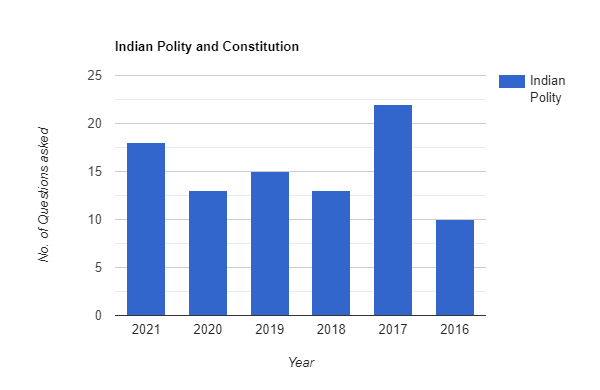Strategy to prepare Indian Polity and Constitution
Indian Polity and Constitution form an important pillar of the UPSC Civil Services Examination. It plays a very dominant role in Prelims, Mains as well as in the Personality Test of the UPSC Civil Services Exam. In order to understand the importance of Indian Polity and the Constitution, let us first analyze the weightage of this subject in UPSC.
Weightage of Indian Polity and Constitution in UPSC Prelims Exam.

If we analyze the above bar graph carefully, one thing that we can clearly understand is that Indian Polity and the Constitution play a dominant role in the Prelims exam. On average, 15-18 questions are asked from this section alone. This accounts for almost 30-36 marks in the Prelims exam. A huge chunk right!!!!!!
This is because, since 2018 the cut-off for the general category for Prelims has been hovering around 100 marks. Surprisingly, the cut-off in 2021 went down to 92 marks. Thus, preparing Polity and Constitution well would ensure that 30% of the cut-off is reached. Now let us talk about the relevance of Indian Polity and Constitution in the Mains examination.
Weightage of Indian Polity and Constitution in UPSC Mains Exam.
Indian Polity and Constitution forms a part of the General Studies Paper – II. Let us first try and break-down General Studies Paper – II into different components. These components are;
- Indian Polity and Constitution
- Governance
- Social Justice
- International Relations
Out of the total 250 marks assigned to General Studies Paper – II, questions worth almost 40% of the total marks (approximately 100-120 marks) are asked from Indian Polity and Constitution. A huge chunk right!!!!!!
Inter-subject connectivity of Indian Polity and Constitution.
Apart from the huge weightage that Indian Polity and Constitution has in prelims and mains, the subject also has a huge inter-subject connectivity. Let us analyze this;
General Studies Paper – I : Indian Society and Culture; Geography of India and the World; Indian and World History
Herein, the significant provisions of the Indian Constitution can be thoroughly applied in order to have a good insight of the Indian Society. For instance, the prevalence of Caste System in India led to the birth of an evil in the society – Untouchability. Now, Indian Constitution through Article 17 aims to eradicate this evil and establish an equal and a just society.
General Studies Paper – II : Indian Polity and Constitution; Governance; Social Justice; International Relations
Herein, it is critical for a candidate to establish a relation between Good Governance and how Constitution ensures that the process of Governance is smooth. Moreover, while a candidate is studying Social Justice, it becomes imperative to understand how various initiatives and programs of the government aim to attain the attribute of a Welfare State stated in various Directive Principles of State Policy (DPSP). For instance, is is critical for a candidate to understand how the the establishment of Lok Adalats and Gram Nyayalaya’s aim to ensure free legal aid to the poor, which is a DPSP.
General Studies Paper – III : Indian Economy; Environment; Internal Security; Disaster Management
Understanding the provisions of the Indian Constitution is a key to have a deeper insight into Indian Economy. For instance, until and unless the candidate is not clear about the process of enactment of budget and the provisions of Article 112 (Annual Financial Statement), he/she would not be able to understand the annual budget tabled in the Parliament every year on 1st February. Also, a lack of information on the role played by certain constitutional bodies such as Finance Commission will be detrimental in understanding the concept of Fiscal Federalism. To sum it up, Indian Polity and Constitution lays down the base for understanding Economy.
Moreover, in subjects like Internal Security, some provisions of the Constitution can be used in understanding the prevalent issues and problems in India. For instance, one of the major reasons for Left-Wing Extremism to thrive in India was the poor implementation of the provisions of the Fifth Schedule. These small inter-subject linkages makes the answer a multi-dimensional one.
General Studies Paper – IV: Ethics, Integrity and Aptitude
In the recent times, UPSC has been focusing on the term “Constitutional Morality”. A thorough understanding of the Constitution and interpreting it in the light of the judgements of the Supreme Court would enable us to understand the moral values which the Constitution tries to propagate. This interpretation can be very useful because in one way or the other, the Constitution is shaping the individual consciousness. Thus, Constitution plays a very integral part in writing answers in ethics. Apart from this, while answering the Case-Study based questions, it is very important to use Constitution as a moral compass to write a realistic answer.
Essay Paper
Essay is a paper where UPSC aims to check one’s imagination and how a candidate can interpret things differently. Moreover, an essay shall be multi-dimensional, which means it should incorporate various pointers from all the subjects. It is here that Indian Polity plays a very significant role. For instance, if a candidate is writing an essay on “Poverty”, then he/she can use the term “Welfare” in order to put up a point on how Indian Constitution envisages betterment of all and aims at minimizing inequality. Thus, Indian Polity will surely help in making your essay’s sound multi-dimensional.
Sources to prepare Indian Polity:
In order to effectively utilize time and study subjects effectively, there is one mantra that every UPSC aspirant needs to follow. The mantra is, “KEEP YOUR SOURCES LIMITED, BUT REVISE THOSE SOURCES REGULARLY”.
In the light of this mantra, we would like you to follow the following sources for preparing Indian Polity and Constitution. These are;
- NCERT Class XI: Indian Constitution at Work.
- Indian Polity by M. Laxmikanth
- The Hindu and Indian Express (Read newspaper regularly)
- Websites:
For Complete Guidance: https://theprayasindia.com/courses




![Prayas-तेजस [UPSC CSE Sociology Optional] – Online & Offline](https://theprayasindia.com/wp-content/uploads/2025/09/Prayas-तेजस-UPSC-CSE-Optional-Subject-The-Prayas-India-300x300.png)
![Prayas-सूत्र [UPSC CSE Materials (Hardcopy)]](https://theprayasindia.com/wp-content/uploads/2025/09/Prayas-सूत्र-UPSC-CSE-Study-Materials-Hardcopy-The-Prayas-India-300x300.png)
![Prayas-मंत्रा [UPSC CSE CSAT]](https://theprayasindia.com/wp-content/uploads/2025/09/Prayas-मंत्रा-UPSC-CSE-CSAT-The-Prayas-India-300x300.png)
![Prayas सारथी [UPSC CSE One on One Mentorship]](https://theprayasindia.com/wp-content/uploads/2025/09/Prayas-सारथी-UPSC-CSE-One-on-One-Mentorship-The-Prayas-India-300x300.png)










